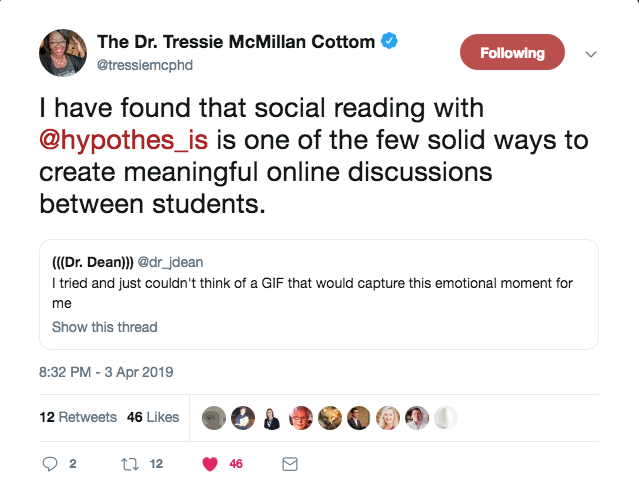Ahead of the OLC Innovate conference in Denver earlier this month, Hypothesis hosted the second of its AnnotatED summits. These regular gatherings are designed to bring together instructors and designers using and supporting annotation in classroom contexts to share their experiences and collaborate on annotation-related projects. Both OLC conference attendees and local Colorado educators participated.
The summit was kicked off by a keynote from University of Colorado Denver’s Manuel Luis Espinoza who shared how his student Right to Learn group is using collaborative annotation to research and discuss court cases related to education rights. Their goal is nothing short of advocating for changes to enshrine education as a human right in the Colorado state constitution and Hypothesis is playing a major role in that important work. Watch to Manuel’s keynote to learn more about how they are using Hypothesis annotation as an indispensable tool for their work in human rights.
“Dignity is what makes our argument comprehensible and intelligible. The human mind makes it possible. But Hypothesis makes it realizable: It helps us to organize our thinking and to archive and curate it and carry it on. It allows us to see what conclusions we have reached. It allows us to learn from our past actions and in the steady expansion of our collective mind.”
— Manuel Espinoza
During the AnnotatED summit, a diverse group of educators from around the country participated in a roundtable describing their experiences using collaborative annotation in the classroom. Presenters included Ann Obermann from MSU Denver, Jonathan Lashley from Boise State, John Stewart from the University of Oklahoma, Remi Kalir and Francisco Perez from CU Denver, and Michael McGarry from Cal State Channel Islands. Watch the roundtable recording to learn about first-hand experience with collaborative annotation across the disciplines at multiple institutions:
Get all the materials from the AnnotatED summit, including slides from the introductory session (also recorded) and the collaborative design thinking activity, where participants explored how annotation could help address problems of practice in pedagogy and professional development.
MERLOT Award
On the first evening of the OLC conference, Hypothesis won the 2019 Classics Award for Teacher Education from MERLOT (Multimedia Educational Resource for Learning and Online Teaching). Director of Education Jeremy Dean accepted the award on behalf of the Hypothesis team. We are honored for this recognition of our work in education, so well-described by the MERLOT Editorial Board:
“Hypothes.is is powerful and effective. It employs current thinking about social learning and collaborative research. It provides high quality instructional media on how and why to use the tool. The site provides models available for a variety of focus areas: research, education, journalism, and publishing. It is a wonderful tool which allows users to annotate anything appearing on the web.”

One of the most exciting moments at the conference came when Tressie McMillan Cottom, in a keynote otherwise quite critical of ed-tech in higher education, mentioned Hypothesis as one of the tools she and her colleagues and students have used effectively in their Digital Sociology degree program at Virginia Commonwealth University. She further emphasized her appreciation for collaborative annotation in a later Tweet.

At OLC Innovate 2019, Hypothesis also led an Innovation Studio workshop in which participants annotated Dr. McMillan Cottom’s writing on digital sociology, demonstrated our new LMS app as part of an Emergings Ideas session, and previewed soon-to-be-released community group capabilities with educators as a tool for student engagement with current issues on the web.
Our deep gratitude to all the people who came together to discuss and experience Hypothesis at OLC Innovate, especially the OLC staff and volunteers that helped make these remarkable events possible. Thank you!
To learn more about adopting open annotation at your educational institution, contact us and subscribe to news from Hypothesis.